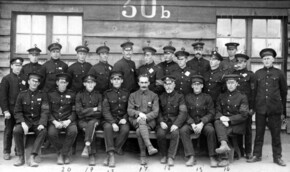WEST, Hugh
| Service Number: | 2464 |
|---|---|
| Enlisted: | 21 July 1915 |
| Last Rank: | Private |
| Last Unit: | 51st Infantry Battalion (WW1) |
| Born: | Walhalla, Victoria, Australia, 1889 |
| Home Town: | Perth, Western Australia |
| Schooling: | Not yet discovered |
| Occupation: | Labourer |
| Died: | Perth, Western Australia, 22 April 1956, cause of death not yet discovered |
| Cemetery: |
Karrakatta Cemetery & Crematorium, Western Australia |
| Memorials: | Ballarat Australian Ex-Prisoners of War Memorial |
World War 1 Service
| 21 Jul 1915: | Enlisted AIF WW1, Private, 2464, 28th Infantry Battalion | |
|---|---|---|
| 13 Oct 1915: | Involvement Private, 2464, 28th Infantry Battalion, --- :embarkation_roll: roll_number: '16' embarkation_place: Fremantle embarkation_ship: HMAT Themistocles embarkation_ship_number: A32 public_note: '' | |
| 13 Oct 1915: | Embarked Private, 2464, 28th Infantry Battalion, HMAT Themistocles, Fremantle | |
| 3 Mar 1916: | Transferred AIF WW1, Private, 51st Infantry Battalion (WW1) | |
| 3 Sep 1916: | Imprisoned Mouquet Farm |
Help us honour Hugh West's service by contributing information, stories, and images so that they can be preserved for future generations.
Add my storyBiography contributed by Stephen Brooks
Hugh West is thought to have been the first Australian to make a successful escape from a German prisoner of war camp in the First World War. He was duly awarded the Military Medal 'in recognition of gallant conduct and determination displayed in escaping, or attempting to escape, from captivity'.
West was born in Victoria in 1891 and was a miner on enlistment in Perth, Western Australia, on 21 July 1915. He embarked for Egypt aboard HMAT Themistocles on 13 October as a member of the 28th Battalion, 5th Reinforcements. He was taken on strength by 'B' Company, 51 Battalion at Tel-el-Kebir on 3 March 1916 and proceeded to France, disembarking at Marseilles on 12 June.
On 3 September, during a dawn attack against Mouquet Farm, West was hit in the back by a piece of shrapnel and knocked over. When he got up he found that his company had continued on to its objective. West then joined up with men from 'C' Company and captured several German trenches. West and about ten others were in one of these trenches when the Germans counter-attacked. Nine of the men were wounded or killed, with West and the remaining man taken prisoner.
West was taken to a billet behind the lines for two days before being taken to Cambrai where he remained for three weeks. He was then sent to Dulmen camp on 26 September where he stayed for two weeks before being sent to work in a stone quarry at Wulfrath. While at the quarry West became ill and was moved to Friedrichsfeld Camp at the end of January 1917. He stayed at Friedrichsfeld until the end of March when he was sent to Hiesfeld to cut firewood. West escaped from there on 9 June but was recaptured on the Dutch/German border by a German sentry on 16 June. He was taken back to Friedrichsfeld and put in a cell for fourteen days with only bread and water. He was then put to work at Walsum Paper Factory on 4 August.
On 9 September West borrowed a pair of pincers from a German sentry telling the latter that he required them to mend his boots. West arranged with Private Thomas Mullen, West Yorkshire Regiment, to escape that night at about 9 pm. West cut through the wire fencing around the camp and the men escaped. Just after they had got away the men met two German women who gave the alarm but as it was dark West and Mullen managed to evade capture. Using West's map and compass the men went north east until they reached the River Lippe then proceeded due North for the Dutch/German border, which they successfully crossed on 13 September. The men were quarantined for twelve days before arriving in England on 4 October 1917.
West was then employed as a waiter in the Sergeants' Mess of the 13th Training Battalion, whilst his application to be discharged was considered. Approval was granted on 29 March 1918. He was discharged from 13 Training Battalion on 6 April and marched out to No. 2 Command Depot, Weymouth. He returned to Australia aboard HMAT Arawa on 15 September 1918 and was discharged on 10 November 1918.
(biography by Australian War Memorial)











